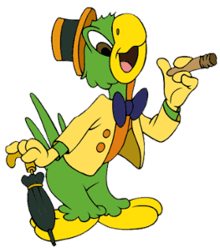José Carioca
| José Carioca | |
|---|---|
 | |
| First appearance | Saludos Amigos (1942) |
| Created by | The Walt Disney Company |
| Voiced by |
José Oliveira (original) Rob Paulsen (1999-present) Eric Bauza (Legend of the Three Caballeros) Bernardo De Paula (DuckTales)[1] |
| Information | |
| Aliases |
Joe Carioca Zé Carioca |
| Species | Parrot |
| Gender | Male |
| Significant other(s) | Maria Vaz (Only in the comics) |
| Relatives | Zico and Zeca (nephews) |
| Nationality | Brazilian |
José "Zé" Carioca (/hoʊˈzeɪ
Comic strip
From 1942 to 1945 there was a comic strip starring José Carioca.
Animation
José appears with Donald and the Aracuan Bird in the "Blame It on the Samba" segment of the 1948 anthology feature Melody Time.
He also appeared in "Two Happy Amigos", and the Disney Channel series Mickey Mouse Works and House of Mouse. He also made a brief cameo in Who Framed Roger Rabbit. José also appeared (alongside Panchito) in an episode of Mickey and the Roadster Racers.
In the Mickey Mouse short "O Futebol Clássico", José is seen as the announcer of a Brazilian soccer game. He later appears with Donald and Panchito in "¡Feliz Cumpleaños!" as performers at Mickey's birthday and in "Carnaval" as a performer in the parade.
Carioca starred in the main role of Legend of the Three Caballeros which was released on Disney Life app alongside Panchito Pistoles and Donald Duck.[3] He is voiced by Eric Bauza in this version. He will also be appearing the second season of DuckTales, in which he will be voiced by Bernardo de Paula.[1]
Comic books
José is quite popular in Brazil, appearing alongside Mickey Mouse and Donald Duck in the local Disney Comics. In Brazil, he's known as Zé Carioca ("Zé" being a familiar form for Portuguese name "José", in much the same way "Joe" is a familiar form for the English name "Joseph"). He currently appears at least every two weeks in his own Brazilian comic books, in which he is portrayed as living with his friends Nestor (an anthropomorphic vulture) and Pedro (Portuguese: Pedrão, an anthropomorphic dog), along with other characters: his nephews Zico and Zeca (also parrots), his girlfriend Maria Vaz (Portuguese: Rosinha Vaz, another anthropomorphic parrot), daughter of rich entrepreneur Rocha Vaz; and his rival Zé Galo (no English name as of 2010; an anthropomorphic rooster). Local production ended in 2001, but was restarted in 2012. José has now a pet, Old Tom, an alligator originated from the 1960s Studio Program duck stories.
Comics featuring Joe Carioca, as he is called in the Netherlands, appear occasionally in the Dutch Donald Duck magazine. In these short stories, José occupies his time assuming false identities to impress girls (who usually see through him, leaving him brokenhearted), and wangling free dinners in expensive restaurants, a habit that often gets him into trouble.
In the Brazilian comics, Zé is also part of his neighborhood soccer team (or acts as a referee) and has a superheroic secret identity, Morcego Verde (Green Bat, a Batman spoof), although he is easily and often recognized, even by his neighbors.
In recent years, José Carioca has been used alongside Panchito and Donald in two comics by American artist Don Rosa, The Three Caballeros Ride Again (2000) and The Magnificent Seven (Minus 4) Caballeros (2005). The creation of a Brazilian animated character during the Second World War was part of a strategy called "Good Neighbor Policy" headed by the United States government to improve relations and gather support amongst its neighbor countries.
Recent uses
In April 2007, Disney re-introduced José Carioca (along with the third Caballero, Panchito), in the newly revamped ride at Epcot's Mexico Pavilion with entirely new animation and a new storyline. It has been dubbed "The Gran Fiesta Tour". After being reunited, The Three Caballeros are set to play a show in Mexico City. But Donald goes missing. José and Panchito must search throughout Mexico for Donald as he takes in various sights around Mexico. The animation was apparently directed by Eric Goldberg.[4] He is now voiced by Rob Paulsen.
José can also be seen in the Hong Kong Disneyland version of It's a Small World, which opened on April 28, 2008, as well as the Disneyland (in California) version of It's a Small World, installed during major refurbishments between January and November 2008.
José and Panchito's costumes were extinct at the Disneyland Resort by 2011, but were re-Imagineered for Mickey's Soundsational Parade in May 2011. They now appear with Donald Duck and dancers with a float where Donald is trying to hit a Piñata.
Legacy
The 2011 animated film Rio draws on José Carioca and Panchito Pistoles for several of its characters.
See also
References
- 1 2 "DuckTales introduces the Three Caballeros at Comic-Con". Entertainment Weekly. July 20, 2017. Retrieved July 20, 2017.
- ↑ "The New Pictures". TIME. 25 January 1943. Retrieved 2009-06-08.
- ↑ Disney Made A ‘Three Caballeros’ TV Series, But Most People Can’t See It
- ↑ "The Three Caballeros return… in Orlando". Cartoon Brew. 2007-04-09. Archived from the original on 2008-11-21. Retrieved 2012-11-26.
External links
- José Carioca at the INDUCKS
- Jose Carioca at Mickey Mouse Athletics
- José Carioca at Don Markstein's Toonopedia. Archived from the original on October 22, 2016.
- José "Joe" Carioca in the HooZoo
- José "Joe" Carioca in a Who's who in Duckburg